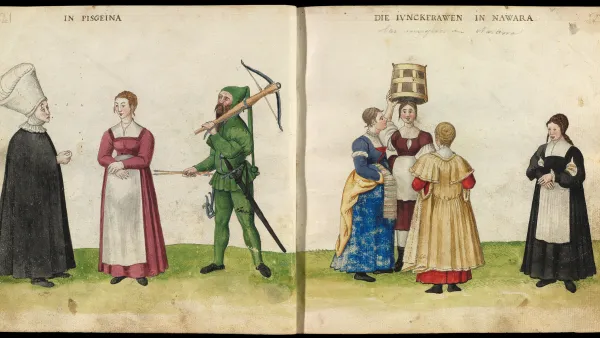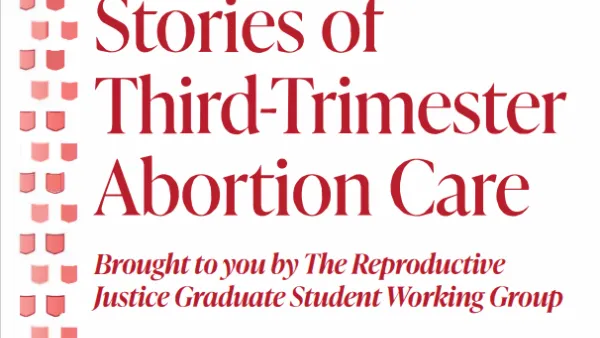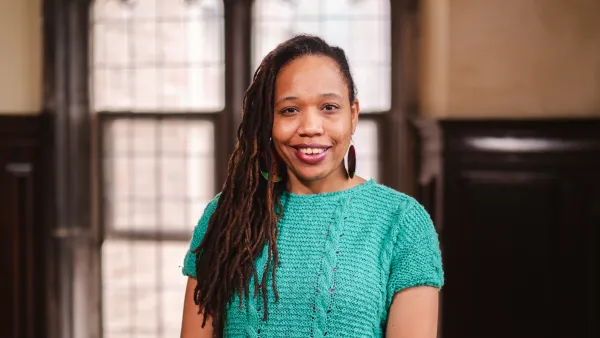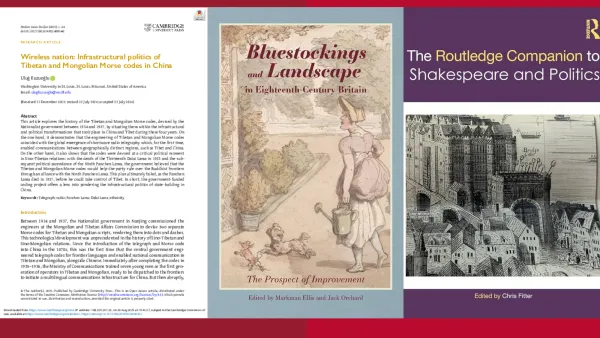Alumna Amanda Scott recently published the first-ever book about Basque seroras, Early Modern women who held professional roles in the Catholic Church outside of monasteries.

As a graduate student at Washington University, Amanda Scott, PhD ’17, spent 100 weeks conducting archival research in northern Spain. Trekking across rural areas to look through the archives of small churches and shrines, she was looking for records related to seroras, unwed women who cared for churches and shrines in the Early Modern period.
Scott, now an assistant professor of history at Pennsylvania State University, became interested in Basque seroras when references to them appeared in court documents related to the trials of priests. Who were these women whom the church trusted to give testimony against priests? Previous studies focused on particular individuals. To tell the story of these women as a group, Scott would assemble an archive from a mass of church records and court documents spread across three countries.
The Basque Seroras: Local Religion, Gender, and Power in Northern Iberia, 1550–1800 (Cornell University Press) is the first book-length study of seroras that focuses on their work across the region. At a time when many European women could choose only between marriage and the convent, Basque women could also choose to work for the church in a more flexible arrangement.
Seroras did a lot of public-facing work that directly impacted the communities they served. They set up the church for mass, maintained the devotional objects, helped dress the priest, helped with funerals, and rang church bells. They even did some counseling and education.
“Seroras are basically the caretakers of Early Modern religious life in Basque country,” Scott said. “For a lot of ordinary people, they are a major part of how they experience local religion.”
The Catholic Church compensated seroras’ labor with a title, housing, and a stipend. They were licensed by the church much like priests, undergoing formal examination by a Bishop before being allowed to begin work.

Becoming a serora allowed Basque women to support themselves while remaining close to the communities that mattered to them, unlike nuns, who lived in convents that were often far from the homes they knew as children. They cared for religious sites that were already important to them in their own communities.
“The tradition of seroras celebrated femininity by placing its social function outside of the household,” Scott said. “These women are doing traditionally feminine work, but in a situation where those traditional skills were celebrated as a job and as something important to the local religious culture.”
Scott is interested in the ways that this occupation offered a more independent path in life for some women. Freed of the dangers of childbirth, these women often lived into their 80s, some living as long as 100 years. Employment offered a form of social security for unmarried women, as well. The women worked in pairs, with an older woman often paired with a younger partner. This arrangement insured that older, unmarried women who might otherwise be less likely to have family to care for them would have someone around.
Convents offered similar security, but required women to take lifelong vows. Seroras, however, could leave their positions as caretakers when it suited them. Nuns took vows of chastity, obedience, and poverty. Seroras had to remain unmarried while working for the Church and took informal promises of obedience, but they could own property. If they decided to marry, leaving their positions did not involve leaving the Church and it presented no legal barriers.
“For women who didn't want to get married, but also didn't want to be away from their communities,” Scott explained, “serving the Church in this way allowed them have close relationships with other women and also stay around their friends and family.”

The idea that women could work both independently and near home arose in a Basque culture with a long history of men being gone while women are left behind. Northern Iberia is a pastoral region where shepherding is a common occupation, leaving many women behind in villages while men follow the grazing herds. Deep-sea fishing, navigation, and whaling were also common professions. Scott noted that Christopher Columbus’s crew had several Basque sailors and that recent research suggests Basque explorers independently reached Newfoundland around the time Columbus arrived in the Americas and possibly earlier.
“It makes more sense,” Scott said, “that women would naturally have taken over a lot of responsibilities that elsewhere would have been left to men.”
Scott’s dissertation was more labor-intensive than most. She developed contacts with archivists in Europe over time, which allowed her to hear about small archives in rural villages that might have otherwise eluded her. She would often get up early to catch the one, two, and sometimes three buses needed to make a three-hour trek to an archive, having only a few hours to work before starting the journey back to her lodgings.
She made those trips to small villages a few times a week for 13 months. Archival research is not for the unambitious.
“I must have had so much energy in my mid-20s to do a project like this,” she said. “Working with Daniel Bornstein was a big part of why I succeeded. Having a good thematic match with your advisor and having their support is essential.”
Recently, Scott was contacted by a researcher with the council that Pope Francis has created to study the idea of reintroducing women to the diaconate. Scott’s research provides needed historical precedent of women having held lay leadership positions in local churches.
“It is important enough to think about the position women had in the past,” she said, “but as a way of maybe bringing new life into the church and helping deal with scandals and conflict, women wanting to take a bigger role would positively benefit the Church.”




